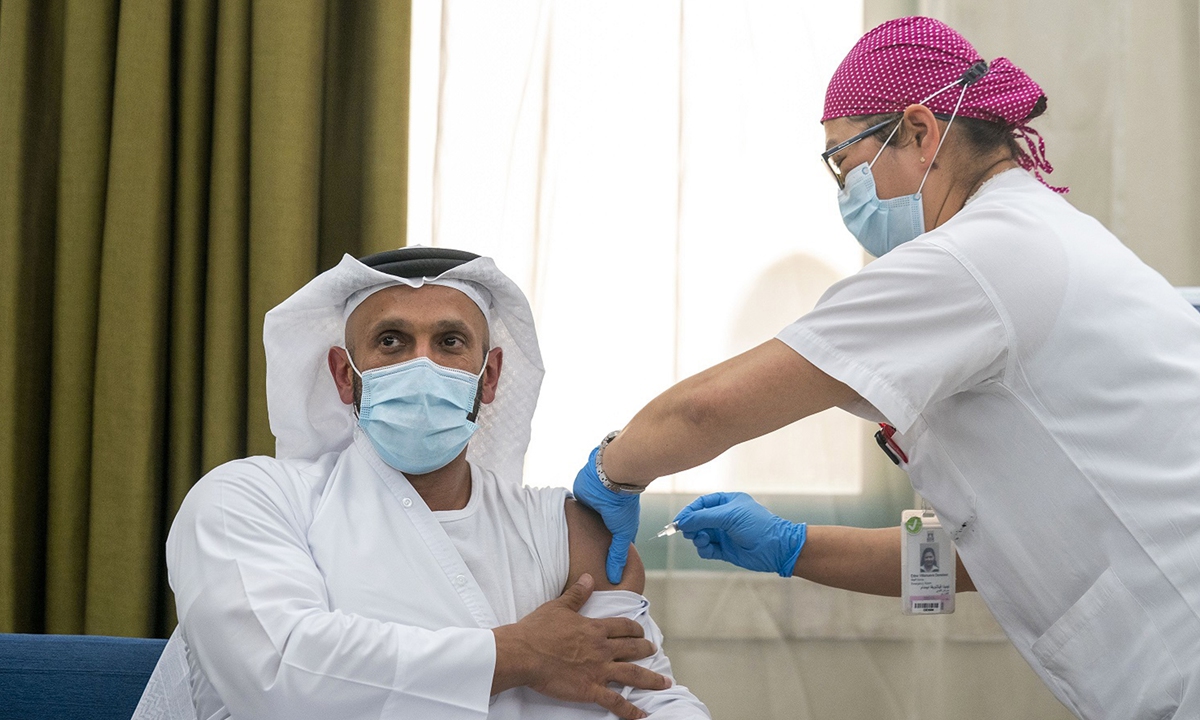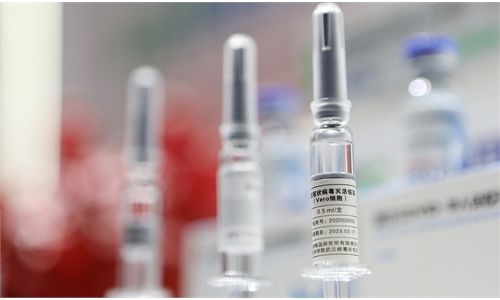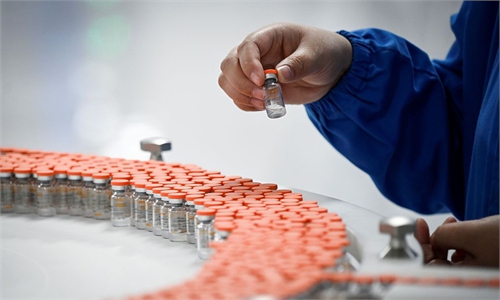
Sheikh Abdullah bin Mohammed al-Hamed, chairman of the Department of Health of UAE, is undergoing a clinical trial for the third phase of the inactive vaccine for COVID-19 in Abu Dhabi. Photo: AFP
On January 24, Egypt started its large-scale immunization program with the Chinese Sinopharm COVID-19 vaccine, becoming one of the first countries in Africa to vaccinate its citizens. Egypt received the Sinopharm COVID-19 vaccine last December through the United Arab Emirates (UAE). On January 20, Seychelles, an African island nation with a population of less than 100,000, became the first to get vaccinated with the country receiving 50,000 doses of the Sinopharm vaccine from the UAE late last year.
Given the ravaging pandemic, the supply of vaccines is still short of demand. The UAE has long cooperated with China and now the country's COVID-19 vaccination rollout is among the top three worldwide. Some analysts said the UAE will become the center of COVID-19 vaccinations in the Middle East this year.
Close cooperation
Currently, the COVID-19 vaccination rate in the UAE is at 26 percent, ranking second in the world behind Israel. More than 25.6 million people have been inoculated and most of them are vaccinated with Chinese vaccines. The UAE plans to vaccinate half of its population by the end of March, according to a CNBC report.
Since September 2020, the UAE started vaccinating its front-line medical workers and government officials with the Sinopharm vaccine, and since late last year, the country has begun vaccinating its entire population.
Now all UAE government employees are required to undergo vaccination and ordinary citizens are urged to be inoculated as soon as possible.
Experts noted that to address the pandemic and vaccines, relevant government organs in the UAE have put in tremendous effort. This time, China's commitment to make vaccines public goods for the global fight against the epidemic, the political trust between the two countries and the strong scientific research and production capacity of Chinese pharmaceutical companies are key pillars of the UAE's ability to push forward mass vaccinations.
While the West kept questioning the safety of the Chinese vaccine, the UAE maintained close contact with Chinese vaccine manufacturers. In July 2020, Sinopharm began Phase III clinical trials to assess its COVID-19 vaccine in Abu Dhabi. In September 2020, the UAE approved Sinopharm's vaccine candidate for emergency use. In December 2020, the UAE approved the vaccine for general use.
It's reported that experts from Sinopharm and the UAE health department regularly communicate and share information with each other, collecting and analyzing problems, providing feedback during the experiment and inoculation process on a regular basis so that Sinopharm's vaccine will be further compliant, improved and recognized by more countries.
According to insiders, a recent rise in the number of buyers from Middle Eastern and African countries purchasing COVID-19 vaccines through the UAE has slowed the pace of vaccination there to avoid supply shortages. The UAE also recently decided to establish a vaccine production facility in Abu Dhabi in cooperation with Sinopharm to meet the growing global demand for vaccines.
'First country in the Middle East producing COVID-19 vaccines'
"We are in the advanced stages of discussion with our key strategic partners and are happy to announce that local manufacturing of the vaccine will be done in the UAE," said Ashish Koshy, chief executive of Abu Dhabi-based G42 Healthcare, UAE newspaper The National reported on January 5.
"We intend to commence production this year," The National quoted Koshy as saying. The UAE is going to produce the COVID-19 vaccine under license from the Chinese drug maker, which will not only meet local but also anticipated global demand, it reported.
After the global pandemic further worsened this winter, the UAE launched a global logistics center on November 26 2020. With Abu Dhabi as its hub, the center plans to deliver and ship billions of doses of COVID-19 vaccines worldwide by the end of this year.
Earlier this month, Abu Dhabi Department of Health spearheaded an organization named Hope Consortium to coordinate storage and distribution of the vaccine, local media said. Initial partners of the Consortium include Etihad Cargo and Abu Dhabi Ports.
The Consortium is the umbrella organization of a UAE-based public-private partnership set up to address the logistical challenge of the worldwide distribution of COVID-19 vaccines, The Loadstar reported on January 22.
Several global logistics and warehousing giants have allegedly joined the organization. The vaccine center in Abu Dhabi, ensuring that vaccines from various countries are stored at the required temperature, will procure and distribute the vaccines according to demand, and track them accurately.
As The National reported on Monday, Hope Consortium hopes to be able to move and store more than six billion vials - whether in single or multi doses - in cold and ultra-cold conditions by next year, rising to more than three times of that by the end of next year. "This represents the largest capacity and capability regionally and one of the largest globally," it said.
At present, there are vaccines from drug makers including Sinopharm, Pfizer, Moderna, and Sputnik V being stored at Abu Dhabi Ports Company's facilities. They are shipped around the world, especially to developing countries in surrounding Asian and African regions, by Etihad Cargo, which is reportedly the first Middle Eastern airline to attain the International Air Transport Association's (IATA) Centre of Excellence for Independent Validators (CEIV) certification for pharmaceutical Logistics.
In a world where the current international political landscape is dominated by the legacy of unilateralism, the approval and selection of vaccines is not only a public health issue, but also a political one. The "Middle East vaccination center" that the UAE set up with the help of China, in addition to its fight against the pandemic jointly with China, will make useful exploration and contributions to pandemic control and economic recovery.
This is obviously different from the "vaccine nationalism" pursued by some major countries, which ignores the availability of vaccine distribution, as well as the rational distribution of vaccines as global public goods.
The UAE will start producing Chinese vaccines later this year under the license of Chinese pharmaceutical manufacturers, meaning that it will become the first country in the Middle East to produce COVID-19 vaccines, said German business news magazine WirtschaftsWoche. Its production plan will go beyond meeting the target of achieving herd immunity in the UAE.
Some Middle Eastern countries including the UAE are using China's vaccines today, which creates a new type of cooperation between Asia's most powerful country and the wealthy countries on the Arabian Peninsula, according to news reports.
The vaccine cooperation shows that the Middle East has become a strategic node of China's Health Silk Road, and a symbol of bilateral cooperation from the two sides in the scientific field, it said, predicting that many other countries may choose to step up cooperation with China on vaccine and science following in the footsteps of their Middle Eastern peers.
China, a 'reliable doer'
As a young country less than 50 years old, the UAE does not have much of a historical burden and is very open to cooperation and exchanges with other countries, including deep cooperation with China in vaccine testing, distribution and transportation.
The clinical trials of Chinese developed vaccines conducted in the UAE in June 2020 were highly anticipated and supported by the UAE's officials and broader public.
Sheikh Abdullah bin Mohammed Al Hamed, chairman of the Department of Health of Abu Dhabi, became the world's first individual to be the subject of a Phase III inactivated vaccine trial for COVID-19 in July 2020. Abdul Rahman Bin Mohammed Al Owais, UAE Minister of Health & Prevention Minister, also received the injection later.
In September, the UAE government approved the emergency use of Sinopharm inactivated vaccines for front-line personnel. Soon after, Sheikh Mohammed bin Rashid Al Maktoum, Vice President and Prime Minister of the UAE, ruler of Dubai, was vaccinated with Chinese developed vaccines, following later with government ministers all being vaccinated with Chinese vaccines, which became headlines and social media topics in the UAE. Some media and government documents have simply referred to this vaccine as the "China Vaccine" or "Beijing Vaccine" and subsequently praised it.
The UAE focuses on practical interests in international exchanges instead of ideology. Although there are huge differences with China in terms of religious culture and political system, it does not affect the strategic mutual trust and in-depth cooperation between the two sides.
The UAE has been actively "looking eastward," making China's success in fighting the pandemic and developing vaccines to become one of its major strategic supporters in responding to the challenge of this pandemic.
However, due to the complex geopolitical environment in the Middle East, the UAE cooperates with the US in military security, and the two countries are allies to a certain extent. On the issue of vaccines, the UAE has also imported the US' Pfizer vaccine and approved emergency use without conducting clinical trials in the country.
In late December 2020, in addition to the Chinese vaccine, Dubai residents had another option - the Pfizer vaccine. Although the quantity is limited and currently out of stock, the waiting time is long with some people from Europe and North American countries still preferring to receive Pfizer vaccines.
On January 21, the UAE government approved emergency use of the Russian "Satellite-V" COVID-19 vaccine, which has undergone clinical trials in the UAE for about four months.
The Chinese vaccine is actively used by the UAE and other countries, causing dissatisfaction from some European and North American countries. Some Western media outlets said it is puzzling that the effectiveness of Chinese vaccines is obviously not as good as Pfizer vaccines, but these countries have still chosen China.
A report in The Economist on January 16 stated that the UAE and Bahrain trust Chinese vaccines, and they hope to get both political and public health benefits. The article stated that reliable data on Chinese vaccines have not been submitted, and some developing countries questioned Chinese vaccines like Europe and the US.


